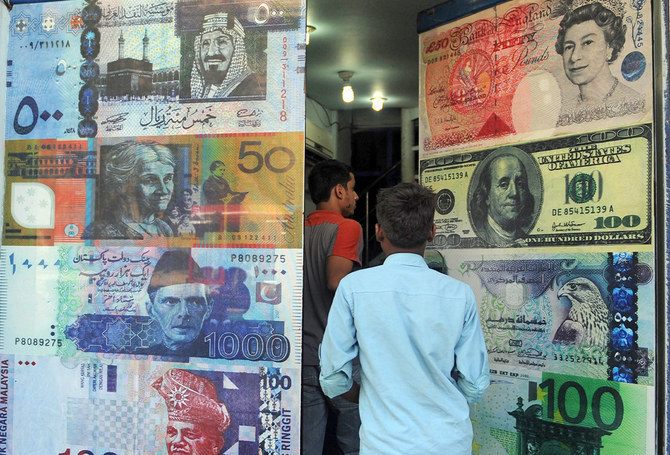KARACHI: Gulf countries, including Saudi Arabia and the United Arab Emirates (UAE), contributed over 54 percent to Pakistan’s remittances during the last fiscal year, data compiled by the central bank showed on Monday, providing a much-needed relief to the cash strapped economy of the South Asian nation.
Pakistan received $31.2 billion from overseas workers in FY22, indicating an annual increase of 6.1 percent in remittances. The inflows from the gulf countries stood at 54.1 percent — or $16.95 billion — of the total remittances received by the country.
Pakistani workers living in Saudi Arabia remitted $7.74 billion during the last fiscal year, according to the State Bank of Pakistan (SBP).
The UAE remained the second largest contributor with $5.88 billion inflows during FY22. The remittances received from other gulf countries, including Bahrain, Kuwait, Qatar and Oman, collectively stood at $3.62 billion as compared to $3.33 billion which the country received in FY21.
Pakistani analysts say the gulf region plays a major role in supporting Pakistan’s economy, not only through remittances also by providing energy security.
“The inflows from Saudi Arabia, the UAE and other Middle Eastern countries play a significant role in supporting Pakistan’s balance of payment situation,” Tahir Abbas, head of research at Arif Habib Limited, told Arab News.
“Pakistan not only receives major remittance inflow from gulf nations but its energy security is also dependent on the region, particularly Saudi Arabia,” he added.
The gulf region offers huge employment opportunities to a large number of Pakistani nationals. According to Pakistan’s Bureau of Emigration & Overseas Employment, more than 2.33 million Pakistanis were employed by the region between 2017 and June 2022. Among them, 1.19 million people were accommodated by Saudi Arabia alone.
“Saudi Arabia and the UAE have played a major role in strengthening Pakistan’s economy by providing employment opportunities to a major chunk of its overseas labor force,” Samiullah Tariq, director research at the Pakistan Kuwait Investment Company, told Arab News.
“The remittances play a great role in supporting the country’s balance of payment as the inflows enable Pakistan to finance its imports,” he continued. “The remittances also support the Pakistani rupee which, in the current situation, is under pressure. It also eases off pressure on interest rate.”
Despite record remittance inflows, the Pakistani rupee on Monday hit record low against United States dollar and traded at around Rs216.01 in the open market.
However, analysts said the recent decline of rupee had taken place due to the landslide victory of former prime minister Imran Khan’s Pakistan Tehreek-e-Insaf (PTI) party in recent by-elections in Punjab province.
“The ongoing political uncertainty may also have its implications for the IMF loan program,” Khurram Schehzad, CEO of Alpha Beta Core, a financial advisory firm, told Arab News. “The stock market is also down more than 700 points.”
Gulf nations contributed 54 percent to Pakistan's remittance inflows during last fiscal year - SBP
https://arab.news/cbh2a
Gulf nations contributed 54 percent to Pakistan's remittance inflows during last fiscal year - SBP

- The central bank says Pakistan received highest ever remittances of $31.2 billion in FY22
- The Pakistani rupee hit another record low of Rs216.01 against the US dollar on Monday
Pakistan urges pilgrims to complete Saudi biometrics as Hajj preparations gain pace

- Government warns pilgrims biometric verification is required for Hajj visas
- Step follows tighter oversight after last year’s Hajj travel disruptions
ISLAMABAD: Pakistan’s government on Friday urged aspiring pilgrims to complete mandatory Saudi biometric verification for Hajj visas, as preparations for the 2026 pilgrimage gather pace following stricter oversight of the Hajj process.
The announcement comes only a day after Pakistan’s Religious Affairs Minister Sardar Muhammad Yousuf said regulations for private Hajj operators had been tightened, reducing their quota following widespread complaints last year, when tens of thousands of pilgrims were unable to travel under the private Hajj scheme.
“Saudi biometric verification is mandatory for the issuance of Hajj visas,” the Ministry of Religious Affairs said in a statement, urging pilgrims to complete the process promptly to avoid delays.
“Hajj pilgrims should complete their biometric verification at home using the ‘Saudi Visa Bio’ app as soon as possible,” it added.
The statement said the pilgrims who were unable to complete biometric verification through the mobile application should visit designated Saudi Tasheer centers before Feb. 8, adding that details of the centers were available on Pakistan’s official Hajj mobile application.
Pakistan has been steadily implementing digital and procedural requirements for pilgrims ahead of Hajj 2026, including mandatory training sessions, biometric checks and greater use of mobile applications, as part of efforts to reduce mismanagement.
Saudi Arabia has allocated Pakistan a quota of 179,210 pilgrims for Hajj 2026, with the majority of seats reserved under the government scheme and the remainder allocated to private tour operators.










